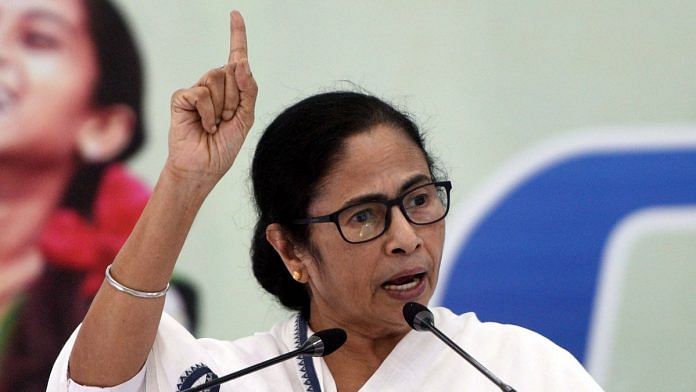One of West Bengal’s most popular boasts is, Baro maashey tayro parbon, which means Bengal celebrates 13 festivals in 12 months. That Bengali saying will now have to be tweaked to say Baro maashey choddo parbon or 14 festivals in 12 months. Because there has been an addition to the official calendar of religious holidays in the state. The new red-letter day is Ram Navami.
It is for the first time ever that Ram Navami has been declared a public holiday in West Bengal – a decision announced by the Mamata Banerjee government on 9 March. The BJP welcomed the decision but questioned Mamata’s motive – was the West Bengal CM driven by Ram bhakti or the fear of losing the Hindu vote?
The holiday brought the ruling Trinamool Congress out on the streets. It celebrated Ram Navami with a gusto that almost matched the Bharatiya Janata Party’s. Apart from leading huge rallies at numerous places, prominent TMC candidates for the upcoming Lok Sabha election vigorously shouted the slogan that was once a red rag for Mamata: Jai Shri Ram.
But today Mamata is silent, signalling, it seems, that if the slogan and the festival garner Hindu votes, then, fine, we will live with it. The BJP is gloating that Mamata has had to eat humble pie and join the Ram Navami brigade. Between the two political parties, it feels like West Bengal is being steamrollered into an era of competitive communal politics that may outlast many of us and take the state down a path it has never been before, at least not since 1947. A path that could lead to perdition.
Ram Navami: A campaign tool?
Certainly, the situation has evolved considerably since 2017. That year, Ram Navami had burst upon West Bengal like never before. Former BJP State President Dilip Ghosh had led a procession around his constituency of Kharagpur, demonstrating his skills at wielding a sword. Mamata had immediately instructed police to file a case against him under sections of the Arms Act.
Ditto in 2018, but for one big change. More TMC leaders than before led Ram Navami rallies of their own. The next year – 2019 – was an election year, and both BJP and TMC unabashedly used Ram Navami as a campaign tool.
The 2019 results, however, shocked the TMC, which slid from 34 to 22 seats while BJP jumped from two to 18. Mamata was bitter and when BJP supporters shouted Jai Sri Ram as she drove past Barrackpore, she saw red. She stopped her motorcade, got out of her car, and shouted at the fleeing offenders. The slogan, she reportedly said, wasn’t an invocation of God but BJP’s war cry.
How different Ram Navami 2024 has turned out to be.
One of Mamata’s star Lok Sabha candidates, actor Deepak ‘Dev’ Adhikari, was seen and heard shouting Jai Sri Ram at a roadshow at his constituency of Ghatal this Ram Navami. Four years ago, he would have been kicked out of the party for such a transgression. Today, no apology or excuse.
“Lord Ram was not born with a BJP flag in his hand,” Dev said, “and I will not let BJP dictate which God’s name I will take and which God I will worship.”
Brave words, uttered, no doubt with the blessings of TMC’s top brass. Words that reveal a shift in the party’s strategy since its 2021 assembly election sweep. Its national ambitions are no secret. Have those ambitions made Ram Navami more acceptable to the TMC? Is that why it allowed itself to be co-opted into the Ram Navami fold? What does it hope to gain? Hindu and Hindi-speaking voters in Bengal and beyond who are veering Right? Could that cost TMC the confidence of its minority voters?
Also read:
Competitive communal politics
A post on X voices a sentiment that should worry the TMC: “Thank u TMC for giving legitimacy to BJP’s cultural aggression in Bengal. Soon coming generation will forget Bengals own festivities like Poila Boisakh & Basonti pujo”.
A debate followed inevitably. “Even Ma Durga has weapons in her hands and Ma Kali too,” was one response, “so what’s wrong with swords at Ram Navami rallies?” Some dragged up the use of weapons in Muharram processions. In Bengal, Ram Navami is not an organic but a politically organised festival, said others; not a celebration but a majoritarian transgression.
“In Bengal worship means flowers, fruits, incense, sandalwood paste and the conch shell. That’s what we have seen from childhood,” wrote @Satyanewshi. “But weapons in hand, playing loud music on ‘DJs’, terrorising people, rioting in places – what kind of puja is this?” he asks. “This is not puja. It is cultural and political aggression.”
West Bengal and TMC would probably have been better off if the TMC had steered clear of Ram Navami politics. No quarrel with the Ram Navami festival but when a festival is weaponised by political parties for competitive communal politics, no good can come of it. The new addition to West Bengal’s calendar of religious holidays sounds ominously inauspicious.
The author is a senior journalist based in Kolkata. She tweets @Monideepa62. Views are personal.
(Edited by Zoya Bhatti)



